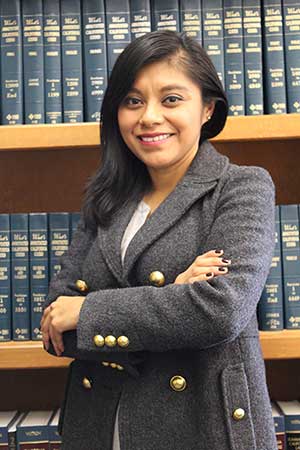 Working in The Workers’ Rights area of The Katharine & George Alexander Community Law Center in fall 2015, third-year law student Lizbeth Mateo was determined to recover her client’s unpaid wages, estimated to be nearly $10,000.
Working in The Workers’ Rights area of The Katharine & George Alexander Community Law Center in fall 2015, third-year law student Lizbeth Mateo was determined to recover her client’s unpaid wages, estimated to be nearly $10,000.
“Mr. G, a bartender earning minimum wage at a major hotel, takes great pride in his work. He likes to do things well, and I did not think it was fair that the hotel was taking advantage of him.” Lizbeth was referring to the hotel’s requirement that he split his 11-hour days by clocking in and out of the hotel for part of his shift and then clocking in and out of the hotel’s restaurant for the second part of his shift. That requirement made it look like he was employed by two different entities, so that he never accrued overtime even though he was supervised at all times by the same manager performing the same work at the same location. On payday, Mr. G received two separate checks paying all of his hours at the regular rate, never at the overtime rate. This went on for several years. When he finally filed a complaint with the Labor Commissioner, the hotel retaliated by firing him. He was partially employed when he sought the assistance of the Law Center earlier this year.
While the case seemed straight-forward at first glance, it proved to be a challenge. The hotel kept inconsistent records of Mr. G’s hours, so Lizbeth had to reconstruct the data based on Mr. G’s memory over a span of years, presenting difficulty in calculating his claim. In addition, she had to establish that the hotel and the restaurant operated as a single entity, i.e. joint employers —a difficult task because records were incomplete. Nevertheless, at the hearing on October 6, 2015, Lizbeth was able to prove that the hotel and restaurant were operated as a single business entity so that both were liable for Mr. G’s wages. Lizbeth’s presentation also persuaded the Labor Commission that Mr. G was entitled to overtime, a penalty, and interest. Mr. G was awarded $16,394.61 in total. When paid, one hundred percent of the award will go directly to a very grateful Mr. G, since all of the Law Center’s services were provided free of charge. The Law Center represents Mr. G in his claim for retaliatory termination which is still pending against the same employers.
“This was my very first time before a judge, and the experience was nerve-wracking mainly because this case included so many uncertainties. But I was glad to have started with a challenging case because it forced me to be very well prepared, and Professor Alvarez certainly helped me do that. This was by far my favorite class this semester because the work I did was real. The thing about the Law Center is that once you start working on a case here, that’s all you want to do. My work is important to my clients and to my future practice.” She plans to pursue a career in Employment Law after graduation in 2016.